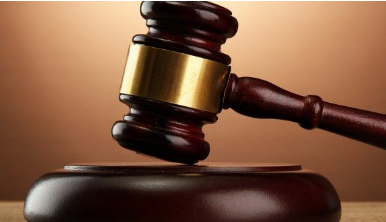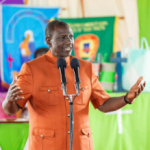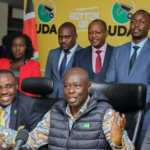In June, I had the rare opportunity to visit the International Criminal Court (ICC) in The Hague, Netherlands, as part of the 125th anniversary celebrations of the city’s role as a center for peace and justice.
Following this, I reached out to Dr. Ruiz Verduzco, the executive director of the Trust Fund for Victims of the ICC, to discuss the planned reparations for Ugandan victims affected by Dominic Ongwen’s crimes.
Ongwen, a former child soldier who became a brigade commander in the Lord’s Resistance Army, was captured by US forces in the Central African Republic in 2015.
On February 4, 2021, the ICC’s Trial Chamber IX convicted him of 61 crimes, including crimes against humanity and war crimes committed in Northern Uganda between July 1, 2002, and December 31, 2005. Ongwen was sentenced to 25 years in prison on May 6, 2021.
The ICC Trial Chamber issued a reparation order against Dominic Ongwen on February 28, 2024, amounting to €52.4 million for the victims of his crimes.
The reparations are structured into three main modalities:
- Cash Compensation: Each victim will receive €750 (approximately Sh100,000) as a symbolic gesture acknowledging the harm they suffered.
- Rehabilitation Services: This includes support to address physical, moral, or material injuries. Examples of rehabilitation services include medical treatment, psychological counseling, and socioeconomic support such as income-generating initiatives.
- Symbolic and Satisfaction Measures: These measures involve memorializing the victims and survivors, as well as commemorating the events to acknowledge their suffering and provide a sense of justice.
The ICC reparation order for Dominic Ongwen’s crimes is set to benefit at least 49,772 individuals who are either direct or indirect victims. This includes:
– Victims in Four IDP Camps: Abok, Lukodi, Odek, and Pajule, where Ongwen was convicted of crimes.
– Victims of Sexual and Gender-Based Violence: Individuals who suffered these abuses in other localities.
– Children Recruited or Used in Ongwen’s Militia: Those who were coerced into or used by the militia.
– Children Born from Rape: Offspring of rape victims.
The reparation package will provide a symbolic cash compensation of €750 (about Sh100,000) per victim, along with rehabilitation services and symbolic measures. The ICC will reach out to victims to collect their information and review applications once the reparation process begins.
The Trust Fund for Victims (TFV) anticipates several challenges in implementing the reparations for victims of the Dominic Ongwen case:
- Time Delays: Setting up and executing the reparation program will take time, and victims will need to be informed about the delays. The court and the TFV are committed to ensuring that victims understand the process and the reasons for any wait.
- Funding Issues: Dominic Ongwen lacks the financial resources to cover the full reparation order, creating a challenge for obtaining necessary funding. This means that some victims might experience longer wait times than others.
- Urgent Needs: To address the immediate needs of the most vulnerable victims, the TFV launched an urgent appeal for €5 million. This funding aims to provide immediate support and prioritize victims in critical need.
- Ongoing Funding Requirements: Beyond the initial appeal, the TFV aims to raise at least €5 million annually to progressively implement the reparation order.
- Planning and Coordination: The judges will decide on a general plan for the reparation program later this year. This plan will outline the implementation strategy and ensure that all potential beneficiaries and stakeholders are informed and involved.
Overall, while the TFV is dedicated to making the reparation program successful, these challenges will require careful management and substantial coordination.
Local community organizations are integral to the reparations process for several reasons:
- Facilitating Consultation and Dialogue: They help in organizing and managing consultations with victims, ensuring that their voices are heard. This involvement is essential for understanding the specific needs and experiences of the affected communities.
- Monitoring and Oversight: Community organizations actively monitor the reparations process to ensure it is effective, transparent, and focused on the needs of the victims. Their oversight helps to ensure that the process remains victim-centered and culturally appropriate.
- Providing Safe Spaces: They create safe spaces for affected individuals and communities to share their experiences and express their needs, which is crucial for addressing the trauma and ensuring that reparations are meaningful.
- Cultural Appropriateness: Their involvement helps to ensure that the reparations process respects local customs and cultural practices, making the reparations more effective and relevant.
- Implementation Partnerships: Local organizations with specialized capabilities can applyto be implementing partners in the reparation program. The Trust Fund for Victims selects these partners through a competitive process that adheres to ICC Financial Rules and Regulations.
Overall, these organizations play a vital role in ensuring that the reparations process is well-informed, respectful, and effective in meeting the needs of the victims.
The Trust Fund for Victims (TFV) is addressing the psychological and emotional needs of victims within the reparations framework in several key ways:
- Assessment of Psychological Impact: The TFV has conducted assessments to understand the psychological and emotional impact on victims of Dominic Ongwen’s crimes. This includes evaluating the moral harm suffered by victims, which encompasses psychiatric and psychological health issues, as well as the stigma faced in their communities.
- Development of Targeted Activities: In response to the ICC reparation order, the TFV is developing specific activities to address these needs. This includes providing psychological treatment and counseling to help victims cope with trauma and emotional distress.
- Engagement with Victims: Since the issuance of the reparation order in February 2024, the TFV has engaged with over 2,700 victims to understand their needs better and to ensure that psychological support is a priority in the reparations process.
- Recognition and Validation: The reparations framework includes measures to recognize the harm suffered by victims. For example, cash payments are seen as a form of recognition of the victims’ suffering.
- Memorialisation Activities: The TFV plans to include memorialisation activities, which aim to honor the victims and contribute to their emotional and psychological well-being. These activities help in acknowledging their experiences and providing a sense of closure.
Overall, the TFV’s approach is comprehensive, focusing on both immediate psychological support and long-term emotional healing through recognition and memorialisation.



